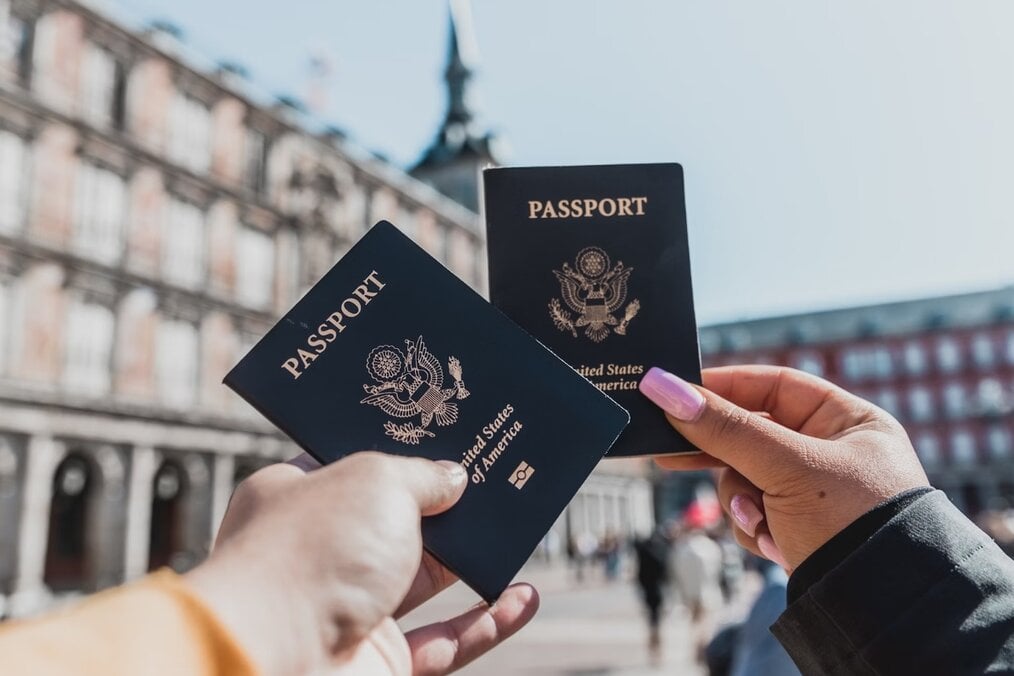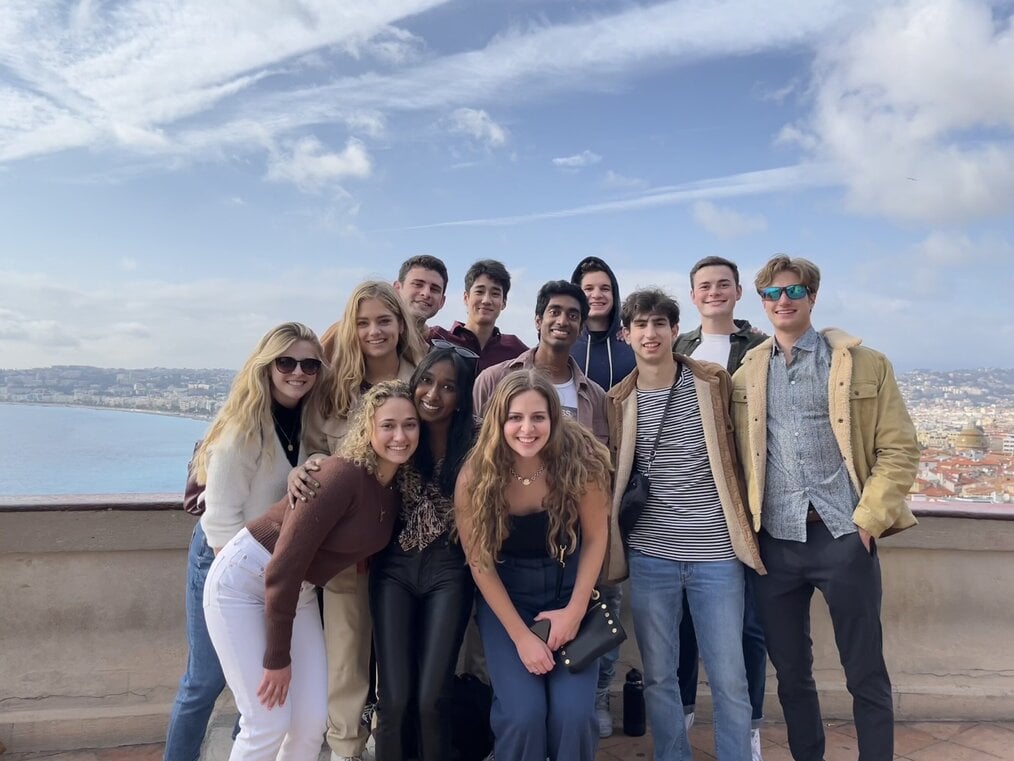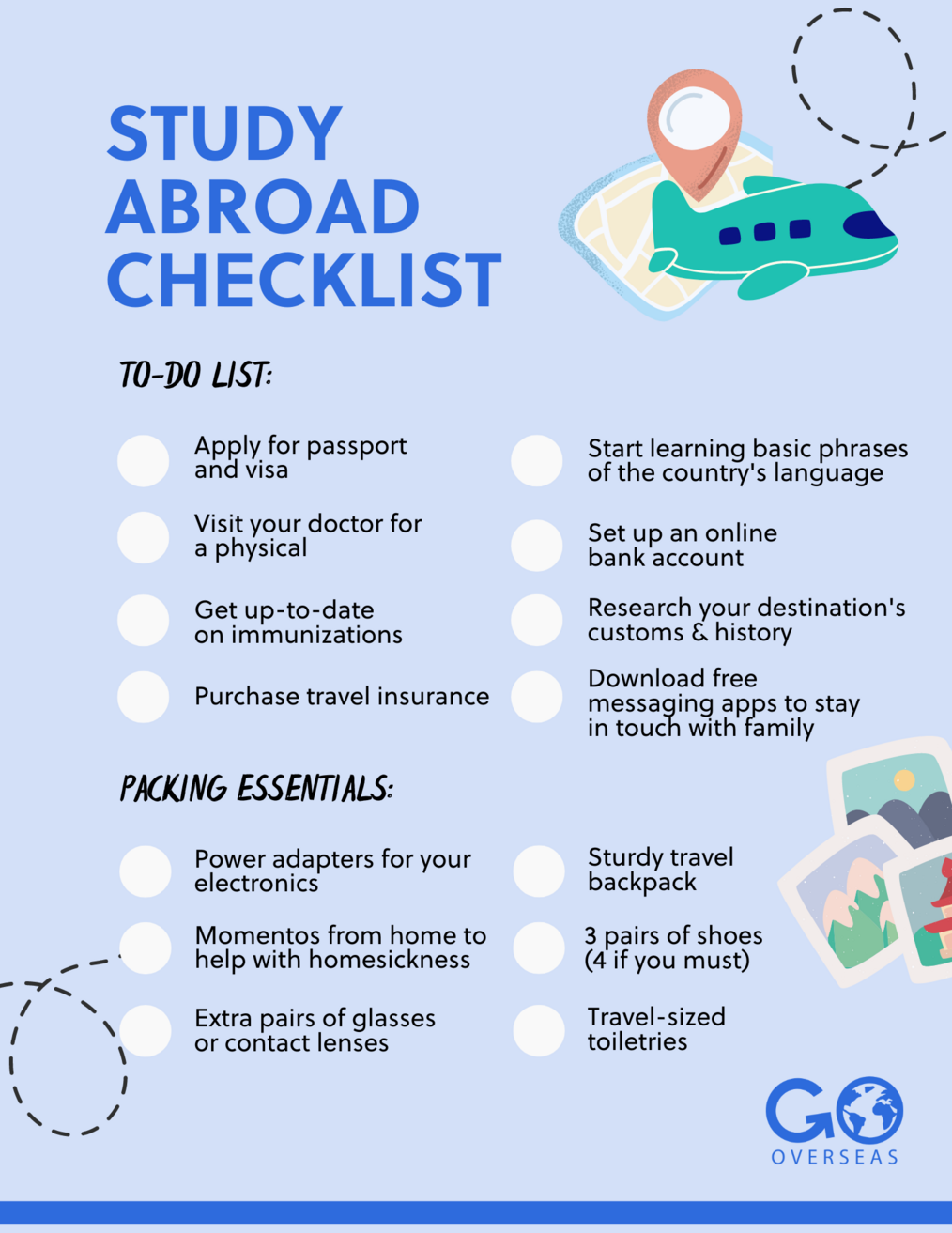
How to Prepare for Studying Abroad: 10 Things to Do Before Your Trip
The ultimate travel checklist to help you prepare for studying abroad!
Once you find the perfect study abroad program that aligns with your goals, it’s time to prepare for your adventure abroad. While thinking about your packing list, travel insurance, and finances isn’t as fun as thinking about the countless memories you’ll make abroad, it’s necessary to ensure you have the best time.
Read on for our checklist of must-dos to help you prepare to study abroad!
1. Prepare your visa and other documents

Whether or not you’re a green or a seasoned veteran when it comes to traveling, people often forget the most important items for their trip.
It’s important that you make sure you’ve not only got the most important documents - such as your visa or passport - but that they’re valid. Be sure to double-check your passport’s expiry date. Immigration officers may turn away people with passports that have less than 6 months validity.
Depending on your nationality and your destination, you’ll likely need to apply for a student visa to study abroad. Your study abroad advisor and program may support you with this stage, but you should be thorough and check your unique requirements when it comes to obtaining the visa. This should be organized with plenty of time ahead of your departure to ensure that your travels go smoothly.
A pro-tip is to have both digital and paper copies of your important documents. Send yourself copies via email in the event that you’re struggling to find them. It’s better to be over-prepared than under-prepared!
Here are some important documents you should have ready:
- Passport
- Visa (stamp, e-visa, or invitation letter)
- Copy of your flight details
- Passport size photos
- Payment
- Academic transcripts required for your school/university abroad
2. Secure housing
Securing housing should be at the top of your priorities before studying abroad. You’ll need to decide your budget, whether you want to live with other people or by yourself, in the city or a quiet neighborhood, and more. While you can do plenty of online research and browsing, there’s only so much you can do independently.
It’s hard to find somewhere to live from afar. You can speak to your study abroad advisor and alumni members who’ll not only provide you with tips on where to live but also useful resources and contacts.
Whether you decide to live by yourself, with other students, or a host family, it’s best to secure your housing in advance. House hunting - while adjusting to the new lifestyle and culture - may amplify culture shock and make your transition more stressful.
The most important factors you should consider are who you want to live with, transportation and proximity to your school, amenities in the area, and of course your budget.
The main options for study abroad housing include:
- Homestay abroad: The benefits of staying at a homestay abroad include connecting with a local family, improving your language abilities and cultural awareness, and more. However, expect to obey house rules, and don’t expect to stay up late partying while you’re a guest under someone else’s roof.
- Student halls: Universities and schools often have their own accommodation specifically for their students. This can be not only a convenient option but a great way to meet other students while studying abroad.
- Private apartment/housing: Renting an apartment to yourself will allow you more flexibility and independence, allowing you to live the lifestyle most convenient for you. However, they’ll typically cost more than other options.
- Shared apartment/housing: Sharing an apartment with other students is an affordable way to live with some independence, all while meeting new people.
3. Purchase plane tickets at least three months in advance
These days, finding cheap airline tickets has turned into the art of timing and luck. Fares can vary greatly depending on when you want to fly, when you’re booking, and where you’re buying your ticket from.
Before buying a bargain fare though, find out how flexible flight date changes are. After all, you don't want to be forced to buy a whole new ticket if you decide to stay overseas a little longer! Buying return flights typically works out cheaper, and paying just a little bit more for flexible dates allows you to change your plan if you meet some amazing people who you want to travel with afterwards.
We also recommend arriving a few days earlier than the program start date if your visa allows it. This will allow you to get over jet lag, embrace the new environment, and familiarize yourself before starting the program.
Additionally, make use of your student status! Student travel agencies can provide the oft-most flexible and inexpensive tickets for students traveling abroad. StudentUniverse, for example, frequently offers discounts and it comes to flight fares.
4. Visit your physician
If you’ve dealt with health issues in the past, consider visiting your doctor and getting a physical before leaving to ensure good health. It's also important to know the host country’s immunization requirements.
You can visit your local health practitioner or a private travel clinic to understand any prevalent diseases or illnesses which you need vaccines for, and so on. You can also check the Center for Disease Control and Prevention for the latest updates.
If you require prescription medication, bring as much as you’re allowed. Prescription drugs must be carried in correctly labeled containers to prevent being mistaken for illegal drugs. Bring a prescription or doctor’s note as well as medical record copies to show to local health practitioners when needed.
It's important to have a reliable health and accident insurance policy while you are studying abroad, as well as coverage for emergency evacuation and repatriation. In addition to covering illness and injury expenses, comprehensive travel insurance will cover:
- Flight delay & cancellation coverage
- Lost luggage
- Stolen personal belongings
- Evacuation in the case of a health emergency or natural disaster
5. Brush up on your language skills
It’s a good idea to learn basic phrases, not only for practical reasons but also for social reasons. Beyond asking for directions, ordering food, and navigating day-to-day situations - making you feel more independent and confident - it will enrich your experience tenfold.
Even a simple “hello”, “please” and “thank you” goes a long way in making your encounters more meaningful when you’re studying abroad. Any genuine attempt to communicate with someone in their primary language shows an effort to immerse yourself in their culture, and will go a long way in building respect.
It's easier to learn the language once in-country, but you can optimize your study abroad experience by listening to podcasts, or downloading apps such as Duolingo or Ling to improve. Once you’re in-country, you can enroll in language classes, ask your fluent friends for insight, and interact with locals each day.
Read more: Why You Should Learn a Second Language
6. Set a budget and manage finances
Without access to finances, you’re not likely to get far abroad, or anywhere for that matter.
Follow these essential finance management steps before heading off:
- Notify your home bank: You'll need to notify your current bank about your plans to study abroad. Otherwise, you risk getting locked out of your account if they see that your card is being used to spend money abroad.
- Set up an online account: It’s imperative that you have access to online banking whether through your computer or mobile banking. In the event of a lost card, fraud, or other, you can update your settings or notify your bank with ease.
- Get an international debit card: Setting up an account with a bank which offers low international fees is a great way to minimize costs abroad. Popular examples of travel cards which have low international fees include Revolut, Starling, Wise, and Monzo. You can also opt for a travel credit card.
- Establish a safety net: For those first few days, and in case of emergency, it’s recommended that you bring around $100-$200 in the local currency. If you are unable to obtain the currency at home, you can withdraw from ATMs at the airport or near your accommodation.
- Take advantage of student discounts: Students have access to many benefits, whether it be at the grocery store, restaurant, library, cinema, or the club! Make sure that you bring your student ID with you in order to make use of student discounts.
- Apply for scholarships and grants: Applying for scholarships and grants is a fantastic way to cover much of your expenses while studying abroad. In fact, thousands go unclaimed each year because many people don’t apply!
Read more: How to Budget for Study Abroad
7. Research local laws and etiquette

When studying abroad, you’re a guest in another country. While people may give you the benefit of the doubt about cross-cultural nuances, it’s important to do your research beforehand.
For example, there are laws in countries which you may never have considered. Something as innocuous as chewing gum is illegal in Singapore. Vaping, for example, while legal in many Western countries, is illegal in many and can result in harsh fines.
Traffic laws also vary drastically from one country to another. In the Philippines, it’s illegal to drive a car on a Monday if your number plate ends with a 1 or a 2! However, you’ll typically just need to consider factors such as the speed limit, legal age limit, it’s important to consider the differences between different countries.
Furthermore, while not illegal, it’s offensive to touch someone’s head or point your feet at someone in Thailand, and an insult to give the thumbs up in some areas of Italy. Your culture doesn’t epitomize others, so it’s important to understand that cultural beliefs and etiquette can vary quite drastically.
8. Pack light (but efficiently)
Packing can be one of the most frustrating aspects of traveling. While it’s hard to make sacrifices, remember to pack light!
Remember, while you’ll be going to a new country with new cultural norms, you’ll have access to most things whether it be clothes, toiletries, electronics, and more.
Here are the most important packing tips you should consider:
- Stock up on toiletries and medication: Stock up on specific toiletries or medication while you find your feet at your new location, allowing you more time to find specific items in-country before you run out.
- Clothing: While you’ll want to anticipate cold, rainy, and warm days depending on the time of year you’re studying abroad, don’t bring too many clothes. You can buy clothes while you’re abroad, and they can even serve as your study abroad memorabilia!
- Airport luggage: Make sure your flight booking includes enough luggage with a checked bag at around 20 kg and a carry-on item. Some agencies charge more for checked baggage, and the airline will penalize you if you exceed your allowance.
- Electronics: Don’t forget to bring useful tools such as power banks, country-specific adapters, and more. It’s no use being stuck in a new country with no phone battery to call a cab or navigate Google Maps.
- Home comforts: To ease culture shock and to make your new house a home, don't forget to bring photos, recipes, and other mementos from home. Consider bringing a journal or notebook to reflect on and write about your study abroad experience. Small souvenirs from your life back home also make great gifts for new friends or host families.
Read more: The Ultimate Study Abroad Packing Guide
9. Download Useful Apps
In addition to communication apps, there are a range of apps you can download to ease your transition into another country. Transportation apps can bring you peace of mind when you first get off your flight and need to get from the airport to your accommodation safely and at a reasonable price.
You may even be surprised to see that Google Maps doesn’t work in certain countries. Popular study abroad country China has banned Google Maps, whereas in South Korea the app is inaccurate due to legalities. Research alternatives such as CityMapper or a country-specific navigation app to find your way around.
There’s an app for almost everything you want to do. Want to learn a language? Try Duolingo or Ling. Want to organize your deadlines? Try Todolist or SmarterTime. Having trouble referencing or citing books in your essay? Use RefME to scan its barcode!
10. Keep connection with loved ones
Goodbyes are tough, but there are many ways you can keep in contact with your friends and family members, and let them know that you’re not only safe but having a fantastic time abroad.
Some students decide to create a travel specific account where they upload all of their travel photos. Or, start a family group chat to frequently check in on your friends and family members. Communication apps such as Zoom, Skype, Whatsapp, and Messenger are easy ways to keep in contact with people from home without having to spend money on international calls.
You should also research the cell phone plan to decide whether it’s cheaper to use international roaming or an in-country SIM card. Typically, students opt for flexible and convenient pay-as-you go plans. If your phone isn't unlocked, you can call your cell phone carrier and ask them to unlock it for international usage.
Read more: Top Apps to Stay in Touch With Loved Ones While Overseas
Start your study abroad experience prepared!

Studying abroad is an exciting adventure where you’ll face new opportunities, challenges, and personal growth. You’ll meet new people, adjust to and embrace cultural quirks, face language barriers, and you’ll become a more confident and self-assured person as a result. While these amazing benefits are waiting for you, preparation will make your experience the best it can.
Prepare for you study abroad experience like a pro:







